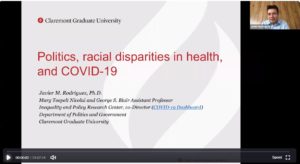Conferences (2019 – 2020)
Politics and Policy of Health Symposium – February 7, 2020.
For more information, see program and flyer.
The 2019 Southern California Comparative Political Science Conference (SC2PI-XIII) – September 13, 2019.
See program here.
The 58th Meeting of Politics of Race, Immigration, and Ethnicity Consortium (PRIEC) – March 29, 2019.
See program here.
Research Talk Series
Our Research Talk Series is a biweekly meeting of faculty and graduate students. The meetings are a space for research conversation, presentations of current research, and trainings on topics related to inequality and research methodology.
Fall 2020
September 17 – Javier M. Rodriguez, Ph.D., IPRC Co-Director, Claremont Graduate University, “Politics, COVID-19, and Racial Disparities in Health” (Webinar recording)

October 1 – Aldo Yanez-Ruiz, Ph.D., Cal State Los Angeles, “Political Candidate Job Titles & Voter Perceptions: Evidence from Two Online Experiments”
October 15 – Melissa Rogers, Ph.D., IPRC Co-Director, Claremont Graduate University, “Voting Your Pocketbook or Voting your Place: Decomposing Variance in Economic Voting” (with Dong Wook Lee)
November 5 – Roya Talibova, Ph.D. candidate, University of Michigan, “Fighting for Tyranny: How State Repression Shapes Military Performance” (with Arturas Rozenas and Yuri Zhukov)
November 19 – Gabriele Magni, Ph.D., Loyola Marymount University, “Boundaries of Solidarity: Immigrants, Economic Contribution, and Welfare Attitudes”
Spring 2020
January 29 – Mark Hoekstra, Ph.D., Texas A&M University, “The Effect of Police Officer Race on Use of Force”
February 26 – Stephen El-Khatib, Ph.D. candidate, UC Riverside, “The Muslims Next Door”
The presentation investigates hostility toward mosques and Muslim Americans in the United States, both through physical attacks and subtle racism. I challenge existing theories related to outgroup contact and threat, against the theory of outgroup institutional context. I postulate that outgroup related buildings and developments such as mosques are seen by some residents as threatening footholds in their community. To test my theory, I developed a Cooperative Congressional Elections Study module on Muslims and mosques in 2018, created a series of datasets which scrape online information on hate crime, and utilized U.S. Internal Revenue Service data to determine the locations of mosques throughout the country. I find that the presence of mosques is significantly related to increases in hate targeting Muslims, whereas the relative size of Muslim populations is not.
March 11 – Barbara Junisbai, Ph.D., Pitzer College, “Patronage Norms in Post-Soviet Eurasia: The President, the First Family, and Intra-Elite Conflict”
In studies of post-Soviet politics, patronage is often described as the ‘glue’ binding presidents and elites and creating powerful material incentives to uphold the status quo. With one hand, the president rewards loyal elites, giving them access to ‘the fruits of office’ and other valued resources; with the other, the president punishes wayward elites, taking away whatever benefits they have accumulated and closing off access to future ones. In this talk I reconsider patronage, moving away from primarily material conception to a normative one. If we think of patronage as an institution, we are presented with an opportunity to explore in a systematic way the rules and expectations governing the material aspect–‘who gets what, how’ and how much–of patronage in personalist regimes.
Fall 2019
September 25 – Gregory Deangelo, Ph.D., Claremont Graduate University, “Police Response and Severity of Crimes”
October 2 – Ahu Sumbas, Ph.D., Hacettepe University, “Women’s Substantive Representation in the Local Politics of Turkey”
October 9 – Nicholas Weller, Ph.D., and Michelangelo Landgrave, Ph.D., UC Riverside, “Do More Professionalized Legislatures Discriminate Less? The Role of Staffers in Constituency Service”
October 23 – Christopher Krewson, Ph.D., Claremont Graduate University, “From a Standard to a Rule: Changes in the Flexibility of Legal Doctrine”
November 6 – Stan Oklobdzija, Ph.D., Post-Doctoral Fellow, Claremont McKenna College, “Citizens United, Dark Money Networks and the Evolution of Political Parties”
November 20 – Rena Salayeva, Ph.D., Post-Doctoral Fellow, Claremont Graduate University, “Strategies for Mobilizing and Rewarding Russian Voters”